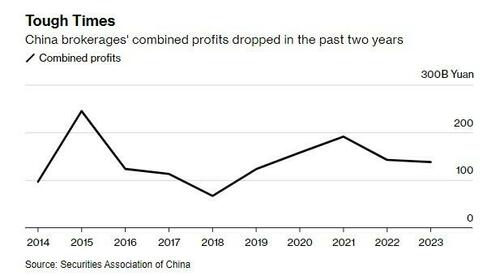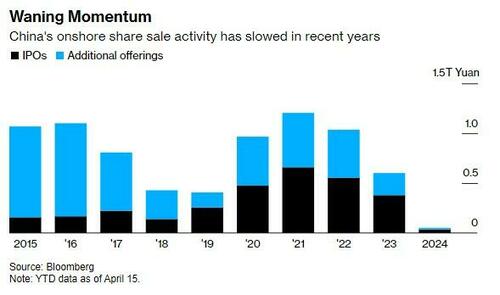
The days of million dollar analyst jobs in the securities industry in China look to be all but gone.
That was the topic of a new Bloomberg article last week which detailed exactly how the industry is "retrenching after years of expansion". Bloomberg's description of the industry's cutbacks is based on discussions with about 20 analysts and former analysts, who chose to remain anonymous or only use their first names.
These reductions are occurring amidst a prolonged market downturn that has lowered trading commissions and increased regulatory restrictions on research publications. It marks a significant shift from previous years when brokerages were actively recruiting and offering substantial salaries to top analysts.
Several senior analysts at Shanghai's state-owned Guotai Junan Securities resigned following pay cuts and stricter performance requirements, the article points out.
Another Shenzhen-based brokerage cut 40% of its analyst staff and reduced their 2023 bonuses by over 50%. Additional cost-cutting measures at other firms include decreased meal and travel budgets.
Sun Jianbo, a former chief strategist at China Galaxy Securities Co. who now runs China Vision Capital, told Bloomberg: “Now with the trading fees cut, the bubble in the research circle will also burst.”
“There’s no other way around. The only thing that matters now is to stay employed. So my approach is to grab a job first and see what comes next," said one 28 year old energy analyst named Anna.
She said her team was cut down from 7 analysts to 2.
Chinese brokerages have traditionally assessed their research analysts based on the trading commissions—referred to as "soft dollars" or paidian—they generate from clients, rather than the accuracy of their forecasts, Bloomberg writes.
This approach spurred the aggressive expansion of research teams and high salaries for analysts. According to China Vision Capital, the number of sell-side analysts in China has surged by almost 70% over the last decade, now exceeding 4,800.
Major firms like China International Capital and Citic Securities employ over 300 and nearly 200 analysts, respectively. Top-performing analysts, particularly winners of popular research contests like New Fortune, could earn up to 10 million yuan annually.
According to Brook Zhang of Bo Le Associates, analysts with ten years of experience might earn a basic salary of about 800,000 yuan, while those with five years can earn around 500,000 yuan, with bonuses ranging from three to 24 months of pay depending on market conditions.
However, the landscape is shifting due to recent regulatory changes reducing trading fees and discouraging the use of commissions for research payments. Additionally, investor interest in China's stock market has waned after three years of losses, diminishing demand for equity research.
This, along with a downturn in sectors like proprietary trading and investment banking and new restrictions on stock market practices, is driving brokerages to significantly cut costs.
“I think these cuts reflect a structural change in the securities business and are hence permanent,” concluded Chen Zhiwu, a professor of finance at the University of Hong Kong. You can read Bloomberg's full report here.
The days of million dollar analyst jobs in the securities industry in China look to be all but gone.
That was the topic of a new Bloomberg article last week which detailed exactly how the industry is “retrenching after years of expansion”. Bloomberg’s description of the industry’s cutbacks is based on discussions with about 20 analysts and former analysts, who chose to remain anonymous or only use their first names.
These reductions are occurring amidst a prolonged market downturn that has lowered trading commissions and increased regulatory restrictions on research publications. It marks a significant shift from previous years when brokerages were actively recruiting and offering substantial salaries to top analysts.
Several senior analysts at Shanghai’s state-owned Guotai Junan Securities resigned following pay cuts and stricter performance requirements, the article points out.
Another Shenzhen-based brokerage cut 40% of its analyst staff and reduced their 2023 bonuses by over 50%. Additional cost-cutting measures at other firms include decreased meal and travel budgets.
Sun Jianbo, a former chief strategist at China Galaxy Securities Co. who now runs China Vision Capital, told Bloomberg: “Now with the trading fees cut, the bubble in the research circle will also burst.”
“There’s no other way around. The only thing that matters now is to stay employed. So my approach is to grab a job first and see what comes next,” said one 28 year old energy analyst named Anna.
She said her team was cut down from 7 analysts to 2.
Chinese brokerages have traditionally assessed their research analysts based on the trading commissions—referred to as “soft dollars” or paidian—they generate from clients, rather than the accuracy of their forecasts, Bloomberg writes.
This approach spurred the aggressive expansion of research teams and high salaries for analysts. According to China Vision Capital, the number of sell-side analysts in China has surged by almost 70% over the last decade, now exceeding 4,800.
Major firms like China International Capital and Citic Securities employ over 300 and nearly 200 analysts, respectively. Top-performing analysts, particularly winners of popular research contests like New Fortune, could earn up to 10 million yuan annually.
According to Brook Zhang of Bo Le Associates, analysts with ten years of experience might earn a basic salary of about 800,000 yuan, while those with five years can earn around 500,000 yuan, with bonuses ranging from three to 24 months of pay depending on market conditions.
However, the landscape is shifting due to recent regulatory changes reducing trading fees and discouraging the use of commissions for research payments. Additionally, investor interest in China’s stock market has waned after three years of losses, diminishing demand for equity research.
This, along with a downturn in sectors like proprietary trading and investment banking and new restrictions on stock market practices, is driving brokerages to significantly cut costs.
“I think these cuts reflect a structural change in the securities business and are hence permanent,” concluded Chen Zhiwu, a professor of finance at the University of Hong Kong. You can read Bloomberg’s full report here.
Loading…






